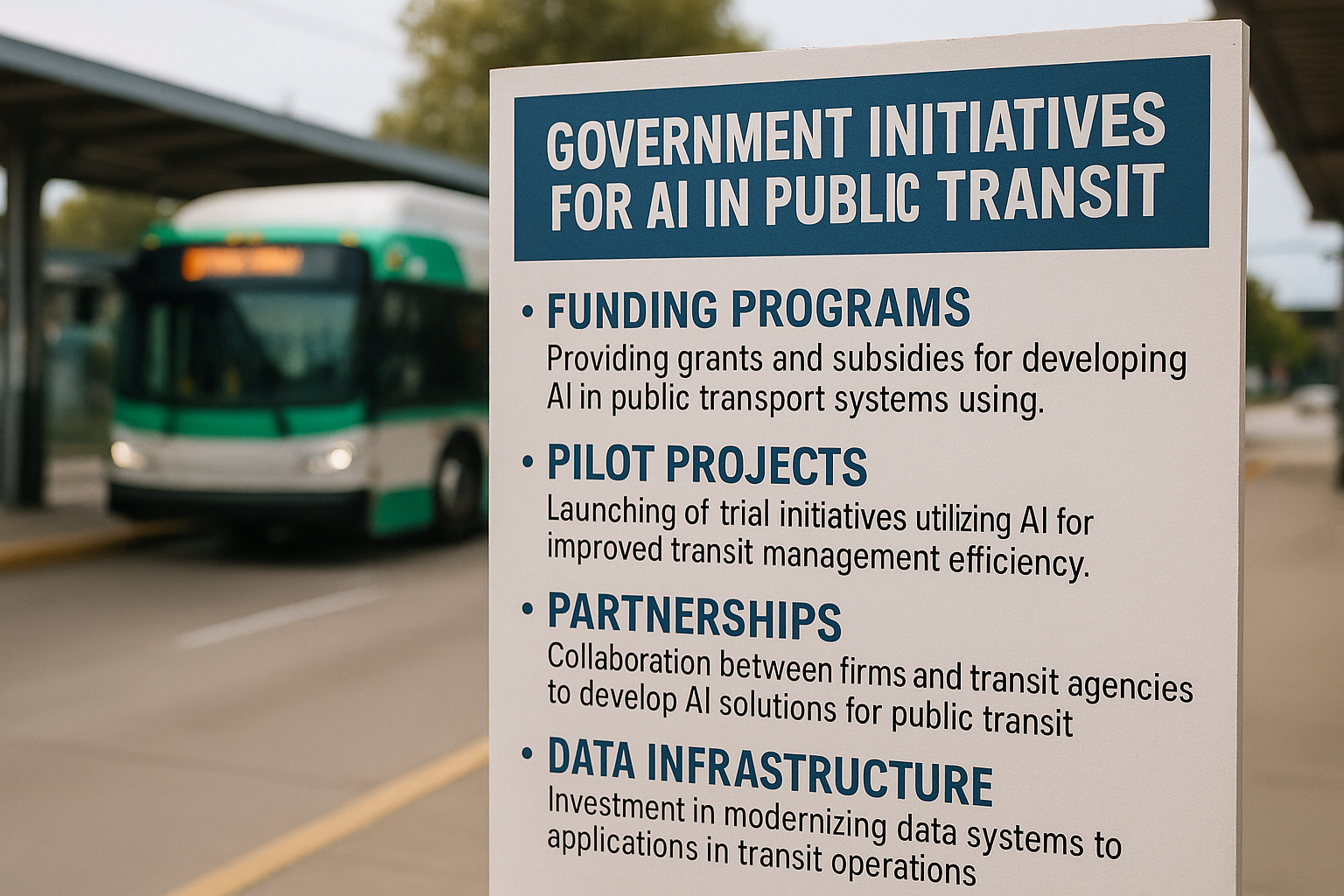
Transforming Transportation: Government Initiatives for AI in Public Transit
- admin
- July 18, 2025
- Uncategorized
- 0 Comments
₹3,200 Crore Investment to Revolutionize Public Transit with Artificial Intelligence
Key Highlights
- Government announces a ₹3,200 crore allocation under the IndiaAI Mission for AI-driven public transportation solutions.
- Focus on real-time traffic management, smart ticketing systems, and autonomous vehicle integration.
- Deployment of AI tools in 100 cities by 2030 to optimize urban mobility.
- Partnerships with global tech firms and leading academic institutions for research and implementation.
- Projected to reduce urban traffic congestion by 25% and improve public transit efficiency by 30%.
The Journey Toward Smarter Transit
In a groundbreaking move to modernize India’s public transit systems, the government has launched a series of initiatives to integrate artificial intelligence into transportation. With a ₹3,200 crore investment, this program aims to address challenges such as congestion, inefficiency, and pollution, transforming how Indians commute.
Union Minister Nitin Gadkari, speaking at the program’s unveiling, remarked, “AI in public transportation is not just about convenience; it’s about creating a smarter, greener future for our cities. This initiative will make public transit more efficient, accessible, and environmentally sustainable.”
AI Innovations in Public Transit
The initiative leverages AI technologies to solve critical challenges in transportation, focusing on:
- Real-Time Traffic Management: AI-powered systems to monitor traffic flow, predict congestion, and adjust traffic signals dynamically.
- Smart Ticketing Solutions: AI-enabled platforms for seamless digital ticketing and contactless payments, reducing queuing times.
- Predictive Maintenance: Tools to monitor public transport vehicles, predict breakdowns, and schedule timely repairs.
- Autonomous Public Vehicles: Testing and integration of AI-driven electric buses and shuttles in urban areas.
- Route Optimization: AI algorithms to analyze commuter data and design efficient routes, minimizing travel time and fuel consumption.
Investments and Implementation
The ₹3,200 crore investment will be distributed strategically to maximize impact:
- ₹1,200 crore for deploying AI traffic management systems in major cities.
- ₹800 crore for implementing AI-powered ticketing and commuter platforms.
- ₹600 crore for research on autonomous vehicles and green transportation solutions.
- ₹400 crore for training programs to upskill public transit operators and planners in AI technologies.
- ₹200 crore for public awareness campaigns to encourage adoption of AI-driven public transit.
By the Numbers
The government’s AI-driven public transit initiative has set ambitious targets:
- Deployment of AI systems in 100 cities across India by 2030.
- Reduction in urban traffic congestion by 25% within five years.
- Improvement in public transit efficiency by 30%, benefiting 50 million daily commuters.
- Testing of autonomous electric buses in 10 cities by 2026.
- Installation of AI-enabled predictive maintenance systems across 5,000 public transport vehicles.
Early Success Stories
Pilot programs have already shown the transformative potential of AI in public transit:
- Bengaluru Traffic Management: AI systems reduced peak-hour congestion by 18%, improving commute times significantly.
- Delhi Metro Ticketing: Smart ticketing solutions increased operational efficiency by 25%, cutting wait times for commuters.
- Pune’s Electric Bus Pilot: AI-driven electric buses optimized routes and schedules, reducing fuel costs by 20%.
Challenges and Mitigation
While the initiative holds immense promise, challenges persist:
- Infrastructure Gaps: Many cities lack the foundational infrastructure needed to support AI-driven transit systems.
- High Implementation Costs: The upfront cost of deploying AI tools is significant.
- Public Adoption: Resistance to adopting new technologies in transit systems can slow progress.
To address these challenges, the government is:
- Expanding urban infrastructure with a focus on digital connectivity and data collection.
- Offering subsidies and incentives to encourage cities and private operators to adopt AI tools.
- Launching public education campaigns to highlight the benefits of AI in transit.
A New Era for Public Transportation
The government’s AI-driven transportation initiative marks a transformative shift in urban mobility. By integrating advanced technologies, the program seeks to make public transit faster, more reliable, and environmentally friendly.
With significant funding, innovative partnerships, and a clear vision, this initiative is poised to reshape how India moves, creating smarter cities and a sustainable future for millions of commuters.




